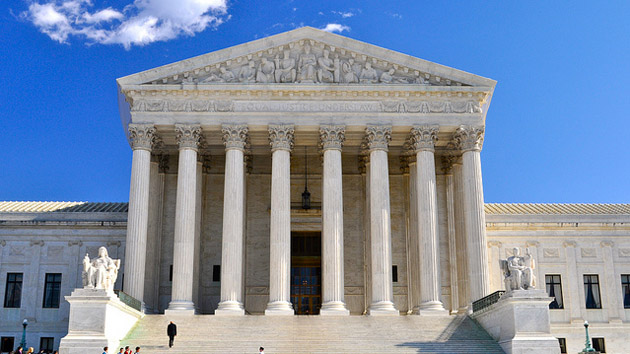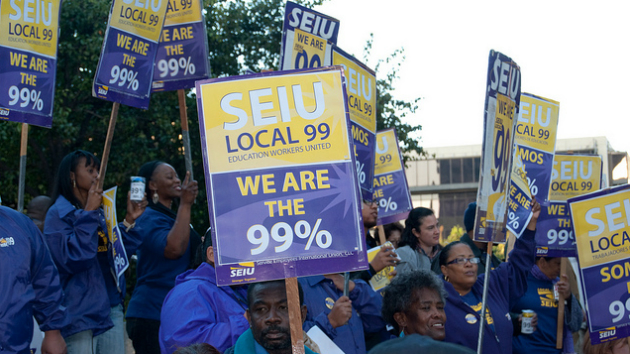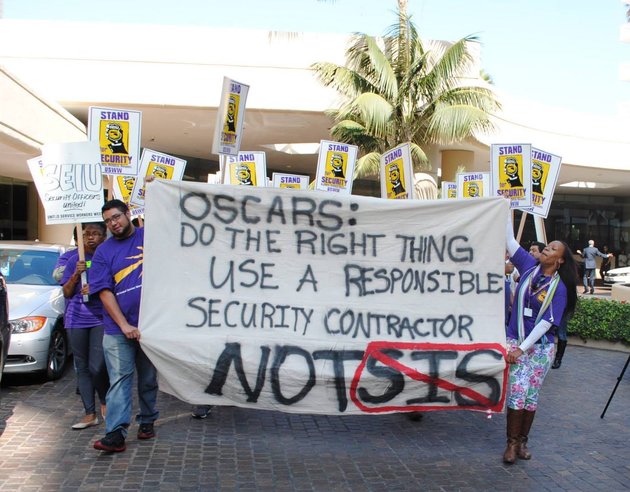
<a href="https://www.flickr.com/photos/60064824@N03/5486338003/in/photolist-4XEn5M-7woJBm-4jPBL-9sMTg8-ct5639-cjK4o3-JdXrP-9mNV9x-87xmzS-7j4MSv-5Y3htE-9sMMC6-5xzLqm-5nGB65-6xaviY-eXMwpm-xj8mr-mFPdVW-fUJT36-6xavfj-xj8dC-6x6kaD-a7Ttts-APqHp-bxJz5t-btfutY-2PPH15-9WGyuY-z5HAY-4Mn6P4-cjK6fC-bg1sun-vdLfX-mfrbpg-5acLkp-tyAdU-9sMQEz-cjK2zL-aRLnGD-bxJz9a-8kk3UD-8MwUve-conrr3-bk8BL2-btygP7-my1QAP-5FEU7p-8HCMSD-csYt7Y-4YhGVt">TexasGOPVote.com</a>/Flickr
On Monday, the Supreme Court’s conservative justices on Monday defied some expectations by not decimating public-employee labor unions via their ruling in Harris v. Quinn. Given the opportunity to issue a sprawling decision that would overturn decades of precedent, and in the process kneecap the basic model of public-employee unionism, the five justices, led by Samuel Alito, instead issued a narrower decision. They ruled that home health care workers in Illinois are not full-fledged public workers and thus cannot be required to pay so-called fair-share fees to unions—money that goes toward the cost of union representation for all workers in a particular workplace.
But we may be back in this same situation a year from now, with the Supreme Court holding the fate of public-employee unions in its hands. That’s because there are a handful of ongoing lawsuits in courts around the country that pose similar challenges to unions as Harris did and that could end up before the Supreme Court. It’s possible that one of these cases could do further damage to the labor movement—with the potential to wipe out the precedent set in 1977’s Abood v. Detroit Board of Education decision. (In Abood, the Supreme Court upheld the constitutionality of public-employee unions collecting fair-share fees from nonmembers to pay the costs of collective bargaining.)
If you’re looking for a common thread between these challenges, it’s the National Right-to-Work Legal Foundation, the driving force behind many anti-union suits around the country. The foundation represented the plaintiffs in Harris v. Quinn, and it has provided legal help in two of the following cases.
Here’s a snapshot of four cases that could be the next Harris:
- D’Agostino v. Patrick: A group of home child care workers in Massachusetts filed suit after the state passed a law designating the SEIU as the exclusive union for those workers. Similar to the Illinois home care workers who brought the Harris suit, the Massachusetts workers claim their rights are being infringed on by being represented by SEIU, meaning union members and nonmembers pay dues in exchange for the benefits that come with union representation. This case is in the Federal District Court of Massachusetts.
- Friedrichs v. California Teachers Association: A group of public school teachers in California claim that the requirement that they pay fair-share dues to the California Teachers Association infringes on their First Amendment rights. Their suit also seeks to ban the “opt-out” model of automatic dues deductions, in which teachers who pay dues must opt out to keep their money from funding union political activity. Instead, the plaintiffs want teachers to opt in to fund that political work. This case is with the US 9th Circuit Court of Appeals.
- Parrish v. Dayton: After Minnesota Democratic Gov. Mark Dayton signed a bill in May 2013 allowing the state’s child care providers to vote to unionize, opponents filed a suit similar to Harris to halt the new law. The suit was on hold pending the outcome of the Harris case. The plaintiffs hailed the Supreme Court’s decision in Harris, and their lawyers now expect movement in Parrish.
- Hamidi v. SEIU Local 1000: This suit targets the part of California law that allows public-employee unions to use the opt-out model for dues paying, as described above. If Hamidi, who works for the state’s Franchise Tax Board, succeeds, his suit could take a bite out of Abood, which in part upheld the practice of opt-out clauses. Hamidi’s case is currently in California district court.













